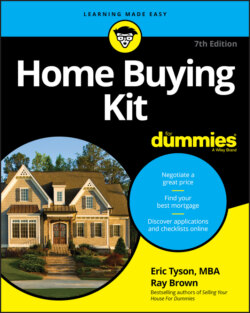Читать книгу Home Buying Kit For Dummies - Eric Tyson - Страница 50
What Can You Afford to Buy?
ОглавлениеIN THIS CHAPTER
Determining the costs and tax benefits of homeownership
Understanding the impact of new tax laws limiting property tax and mortgage interest write-offs
Getting a grip on closing costs
Accumulating and investing the down payment
When you’re in the market for a car, the auto salesperson will eventually ask, “What is your budget?” or “How much can you afford to spend on a car?” Of course, they hope that a large number rolls off your tongue. If you’re like many car buyers, you may be likely to say something along the lines of, “I’m not really sure.”
Many car buyers today finance the purchase — so they allow a banker or other lender to determine how much car they can afford. Such determinations are based on a buyer’s income and other debt obligations.
But here’s where most people get confused. When a lender says you qualify to borrow, say, $30,000 for a car purchase, this doesn’t mean you can afford to spend that much on a car. What the lender is effectively saying to you is, “Based on what little I know about your situation and the fact that I can’t control your future behavior, this is the maximum amount that I think is a prudent risk for my organization to lend to you.”
The lending organization normally requires a certain down payment to protect itself against the possibility that you may default on the loan. Should you default on an auto loan, for example, the lender has to send the repo man out to take away and sell your car. This process takes time and money, and the lender will surely get less for the car than the amount that you paid for it.
Much of the same logic applies to a home purchase with one important difference — over time, your home should hopefully appreciate in value whereas a car most definitely will not.
In this chapter, we help you determine what you can comfortably afford to spend on a home as well as how to calculate how much a particular home is likely to cost you.
